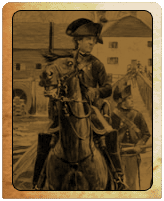
Count Carl Emilius von Donop (died October 25, 1777) was a Hessian Colonel who fought in the American Revolutionary War. The son of a noble family of Hesse-Kassel (or Hesse-Cassel), Donop was well connected in the European courts and served as personal adjutant to the Landgraf of Hesse-Kassel. When the American Revolution began, Donop asked for leave to serve in America, and the Landgraf appointed him as the commander of the prestigious Jäger Corps. A highly ambitious officer, Donop hoped to remain in America after the war to pursue dreams of power and glory. Wearing a veneer of civility and deferential to his superiors, Donop was an able officer but was not well-liked by his subordinates. To his inferiors he was short and harsh, and he had a take-no-prisoners policy that was enforced by severe beatings.
Donop's troops participated in the initial British landing on Long Island on August 22, 1776, and in the landing at Kip's Bay on Manhattan Island on the night of September 14. Donop distinguished himself at the Battle of Harlem Heights, going to the aid of the British troops involved.
Donop was the senior officer present in southern New Jersey in late 1776, and commanded the garrisons in Trenton, Burlington, and Bordentown, which consisted of several Hessian battalions, the Forty-second Highland Regiment (commanded by Colonel Stirling), and Jäger detachments. He was encamped at Bordentown at the time of the Battle of Trenton, with one battalion occupying the town and the rest billeted along the country roads. His overall commander was Major General James Grant. Donop wanted to absorb Colonel Johann Rall's brigade into his garrison to fortify Trenton, but Sir William Howe was persuaded to let Rall hold command on his own in Trenton. Warned by locals of impending attack, Donop warned Grant, who dismissed these cautions. When the Continental forces attacked Trenton, von Donop withdrew from Bordentown without attempting to march to Rall's aid.
When Howe's forces captured Philadelphia in 1777, he then acted to open the Delaware River to the navy. The effort was directed at the forts on either side of the river. The Royal Navy attacked Fort Mifflin in Pennsylvania. In an attempt to recoup his tarnished reputation from his defeat at Trenton, Donop volunteered to attempt the capture of Fort Mercer in Red Bank, New Jersey. General Howe agreed, and gave Donop command of 2000 Hessian troops, with which he crossed the Delaware River on October 22. That afternoon, Donop surrounded the fort and demanded surrender from Colonel Christopher Greene with the threat of invasion and no quarter. Greene, in a strong position with four hundred Rhode Islanders and in possession of plentiful cannon, grapeshot, and powder, rejected the demand. Three attacks and four hundred Hessian casualties ensued, including Donop himself. Fatally wounded in what would be known as the Battle of Red Bank, he died two days later on October 25, 1777.
PREVIOUS: Colonel Johann Rall | Count Carl Emilius von Donop | Biographies
